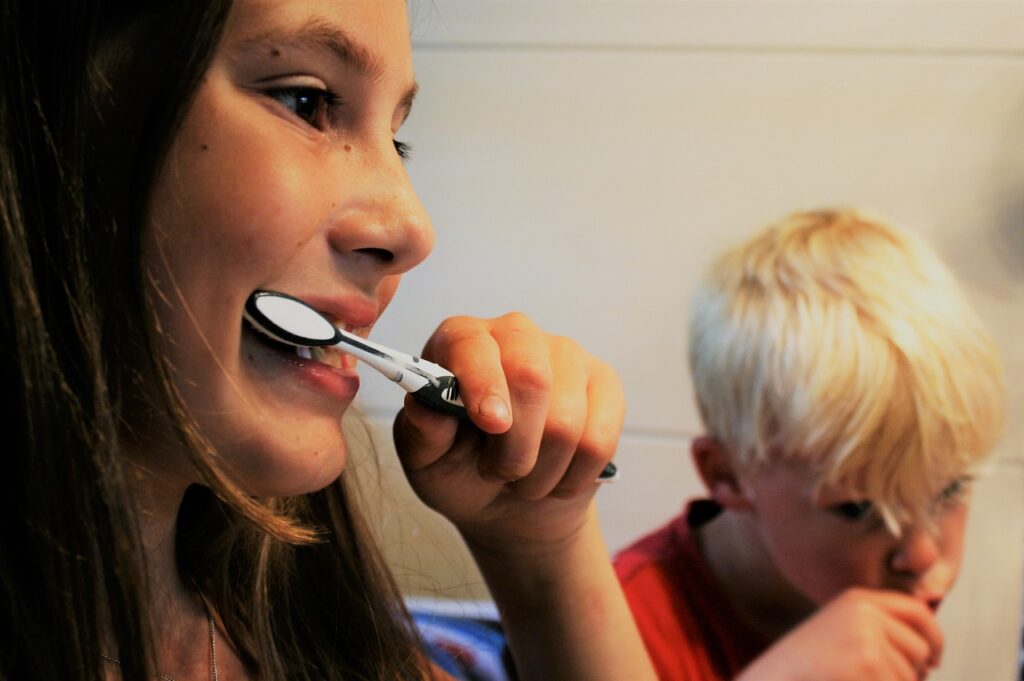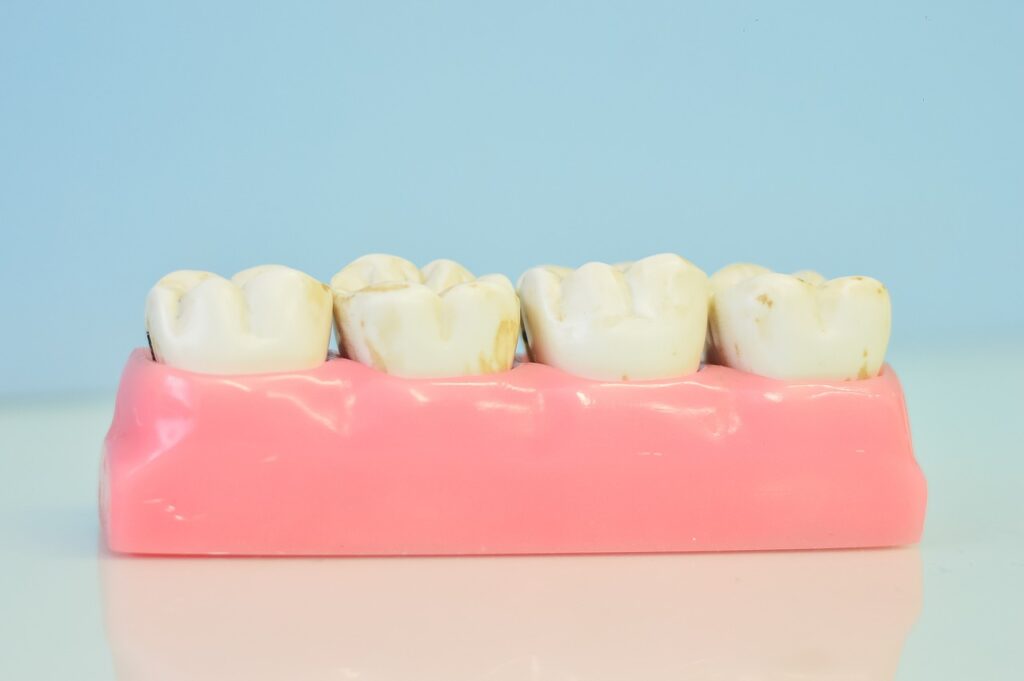The importance of preventative dental care in inhibiting the accumulation of plaque and tartar cannot be overemphasized. These hard deposits harbor bacteria that can lead to severe oral health issues such as gum disease and tooth decay. Effective oral hygiene practices and a healthy diet can mitigate these risks. What then, one might ask, are the best strategies to prevent plaque and tartar build-up? How can we improve our dental health and maintain a bright, confident smile? These are some of the questions we aim to answer as we navigate the intricacies of preventative dental care.
Understanding Plaque and Tartar
Every individual, irrespective of age or dental hygiene habits, is susceptible to the development of plaque and tartar on their teeth. Plaque formation is a natural process that begins when bacteria present in the mouth interact with sugars and starches from food, forming a sticky film on the teeth. If not removed regularly through brushing and flossing, plaque hardens into tartar, a yellow or brown mineral deposit that adheres strongly to the enamel and can only be removed by a dental professional.
Plaque formation and tartar buildup are not just cosmetic concerns. The same bacteria that contribute to plaque and tartar also produce acids that can damage tooth enamel, leading to cavities. Furthermore, because tartar forms below the gum line as well as on the tooth surface, it can create an environment conducive to the growth of additional bacteria, potentially leading to gum disease.
The Impact on Oral Health
Your oral health’s importance is directly influenced by the presence of plaque and tartar. These substances, formed by bacteria, food particles, and saliva, adhere to the surface of your teeth and can have a profound impact on oral hygiene if not properly managed.
Plaque formation is a continuous process, and when not removed regularly, it can harden into tartar buildup. This hardened substance is more challenging to remove and can cause gum health issues, like gingivitis and periodontitis. Untreated, this can lead to tooth loss, affecting both your dental aesthetics and functionality.
Proper dental education can help individuals understand the significance of maintaining good oral hygiene. Enamel protection is also vital, as plaque and tartar can erode the enamel, the tooth’s protective layer, leading to cavities and tooth sensitivity.
Effective bacteria control methods, including the use of antibacterial mouthwash, can help guarantee fresh breath and reduce the risk of plaque and tartar buildup. Remember, a clean mouth is not just about having a bright smile; it’s about safeguarding your overall health. Regular dental check-ups and cleanings are essential components of preventative dental care.
Daily Brushing Techniques
Mastering appropriate daily brushing techniques is pivotal in the maintenance of ideal oral health. The first step in accomplishing proper oral hygiene is toothbrush selection. Quality toothbrushes have soft bristles that can reach into the crevices of teeth, removing food and plaque. A small head is advised to access all areas in the mouth, including the hard-to-reach back teeth.
The second aspect of daily brushing techniques involves brushing frequency. Dentists recommend brushing at least twice a day, preferably morning and night. This frequency aids in the removal of plaque, the sticky bacteria that forms on teeth. Brushing should last for two minutes, covering all surfaces of each tooth.
The brushing technique itself is also critical. The toothbrush should be held at a 45-degree angle to the gums. Using gentle, circular motions, all surfaces of the teeth – the outer, inner, and chewing surfaces should be brushed. For the inner surfaces of the front teeth, tilt the brush vertically and make several up-and-down strokes.
Implementing these daily brushing techniques will aid considerably in plaque and tartar prevention. The subsequent subtopic will focus on the complementary role of flossing in maintaining ideal oral health.
Importance of Flossing
In addition to daily brushing, flossing plays an essential role in preventative dental care. It is a critical practice that guarantees overall oral health by removing plaque and food particles that toothbrushes cannot reach. Flossing benefits are numerous, extending beyond maintaining a clean mouth to preventing serious oral and overall health complications.
Effective flossing techniques involve using a piece of floss approximately 18 inches long, winding most of it around each middle finger, leaving an inch or two for the flossing process. The floss should be held taut, inserted between the teeth and gently moved up and down, conforming the floss to the shape of each tooth. Care should be taken not to snap the floss into the gums, which can cause injury.
Regular flossing prevents the build-up of plaque, which when not removed, hardens into tartar, a substance only removable by a dental professional. The build-up of plaque and tartar can lead to gum disease and tooth decay. Moreover, research suggests a link between oral and overall health, indicating that flossing may also help prevent certain diseases such as heart disease and diabetes. Therefore, understanding the importance of flossing and employing proper flossing techniques can greatly enhance one’s dental and overall health.

Role of Mouthwash in Prevention
Complementing regular brushing and flossing, mouthwash serves as a beneficial tool in preventative dental care. Acting as an adjunctive therapy, it reaches areas of the mouth that may be missed during brushing and flossing. The effectiveness of mouthwash in preventing plaque accumulation and tartar formation is largely due to its active ingredients.
There are several types of mouthwash available, including cosmetic, therapeutic, and natural. Cosmetic mouthwashes help control bad breath and leave a pleasant taste, but do not kill bacteria. Therapeutic mouthwashes, on the other hand, contain active ingredients such as cetylpyridinium chloride, chlorhexidine, and essential oils, which are scientifically proven to reduce plaque, gingivitis, and bad breath. Natural mouthwashes use organic ingredients such as aloe vera, chamomile, and tea tree oil, offering a more holistic approach.
Mouthwash ingredients play a crucial role in dental health. Fluoride, a common ingredient, strengthens the teeth’s enamel making it more resistant to decay. Antimicrobial agents like chlorhexidine and cetylpyridinium chloride kill bacteria, reducing plaque and gingivitis. Hence, incorporating a suitable mouthwash into your daily oral hygiene regimen can help maintain good dental health.
Diet Choices for Healthy Teeth
Balancing a nutritious diet is not only beneficial for overall health but also plays a vital role in maintaining ideal dental health. Consuming nutrient rich foods such as fruits, vegetables, dairy products, and lean proteins can help strengthen teeth, promote gum health and reduce the risk of dental issues like plaque and tartar. These foods are packed with essential vitamins and minerals that are essential for oral health.
Particular attention should be given to limiting the consumption of foods and drinks high in sugars and carbohydrates. These substances are known to contribute to the formation of plaque, which can lead to tooth decay and gum disease if not properly managed. Sugar substitutes such as xylitol and stevia can be effective alternatives as they do not contribute to tooth decay.
Drinking ample amounts of water also aids in maintaining oral health. It helps to wash away food particles and neutralize the acid produced by bacteria in the mouth. Incorporating these diet choices into your daily routine can greatly help protect your teeth and gums, thereby contributing to a healthier dental hygiene.
Regular Dental Check-ups Importance
The significance of regular dental examinations cannot be overstated in maintaining ideal oral health. These routine check-ups play an essential role in identifying potential dental issues at their onset, allowing for timely intervention and treatment. An effective preventative dental care strategy necessitates a commitment to regular dental visits, highlighting the importance of this practice in ensuring overall dental health.
Importance of Routine Examinations
Emphasizing the importance of routine examinations, or regular dental check-ups, is essential in the field of preventative dental care. Regular dental visits not only guarantee the maintenance of healthy teeth and gums but also contribute to overall health by detecting any potential issues early on.
In the domain of children’s dentistry, routine examinations play a pivotal role in establishing a solid foundation for oral hygiene that lasts a lifetime. These visits allow for proper instruction on brushing and flossing techniques, beneficial habits, and diet, which can greatly influence dental health.
The fear or unease about dental visits, often referred to as dental anxiety, can be a considerable barrier to seeking regular care. However, routine examinations can actually alleviate this anxiety over time. Familiarity with the dental office environment, the staff, and the procedures can demystify the experience and help to reduce fear. Regular dental visits also allow for a relationship to develop between the patient and dental care provider, which can further serve to decrease dental anxiety.
Detecting Dental Issues Early
Nearly all oral health issues, from cavities to oral cancer, can be detected early during routine dental check-ups. These check-ups play a pivotal role in early warning and symptom recognition, allowing for timely interventions and preventing minor issues from escalating into severe dental problems.
Identifying dental problems at an early stage greatly reduces the complexity and cost of treatment. Dental professionals use various diagnostic tools during check-ups to detect signs of issues often invisible to the naked eye. These may include early-stage cavities, gum disease, or even oral cancer.
Early warning signs of these conditions, such as tooth sensitivity, gum bleeding, persistent bad breath, or unusual oral sores, are carefully examined. Recognizing these symptoms early can lead to preventative measures, such as enhanced oral hygiene routines or dietary changes, and arrest the progression of the disease.
Regular dental check-ups also facilitate the removal of plaque and tartar, preventing tooth decay and gum disease. Additionally, these visits offer an opportunity to assess overall oral hygiene practices and reinforce the importance of proper brushing and flossing.
Frequently Asked Questions
What Are Some Natural Remedies to Prevent Plaque and Tartar Buildup?
Natural remedies to prevent plaque and tartar buildup include oil pulling, which involves swishing oil in the mouth, and making dietary choices like eating raw vegetables and reducing sugar intake to maintain dental hygiene.
Can Sugar-Free Gum Help in Preventing Plaque and Tartar?
Yes, sugar-free gum can aid in plaque and tartar prevention. Chewing stimulates saliva production, which neutralizes acids. Additionally, sugar substitutes, like xylitol, may inhibit bacteria that cause plaque from sticking to the teeth.
Are There Specific Dental Care Recommendations for People With Braces?
Yes, individuals with braces require specific dental care. Emphasis should be on regular braces maintenance, including thorough orthodontic cleaning to remove food particles and prevent plaque buildup, ensuring ideal oral health during orthodontic treatment.
How Does Smoking Affect Plaque and Tartar Formation?
Smoking considerably exacerbates plaque and tartar formation, increasing oral health risks. The toxins in tobacco smoke hinder saliva production, facilitating bacterial growth. Maintaining diligent oral hygiene is critical to mitigate smoking consequences on oral health.
How Does Plaque and Tartar Affect Children’s Dental Health Differently Than Adults?
Plaque and tartar can severely impact children’s dental health, potentially causing early tooth decay and gum disease. Child dental hygiene, including regular brushing and flossing, is essential for effective plaque prevention strategies to maintain healthy teeth and gums.
